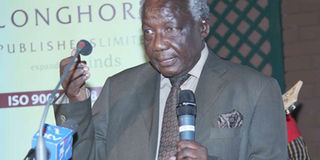It’s important to choose right words for newspaper headlines

Columnist Philip Ochieng speaks at Sarova Stanley hotel in Nairobi on August 21, 2015. PHOTO | CHARLES KAMAU | NATION MEDIA GROUP
What you need to know:
Columnist Philip Ochieng’s favourite dictionary is the Collins English Dictionary.
- He uses it as authority for almost everything.
- But even the Collins English Dictionary says the word “over” can be used to mean “in reference to, concerning, about, while engaged in, or occupied with”.
In Things Fall Apart by Chinua Achebe, it is said that proverbs are the palm oil with which words are eaten. In Igbo culture, the art of conversation is highly valued. In journalism, the art of writing compelling headlines is also highly valued. But it is also a challenge because of the limited number of words and space. To paraphrase Achebe, the choice of words is the palm oil with which newspapers are bought and read.
That is why, I believe, Philip Ochieng has told Kenyan journalists over and over in his Saturday Nation column “Mark My Word” not to use the word “over”, especially in headlines because he believes it is the wrong choice for good and compelling headings. The column was originally conceived to teach Nation Media Group journalists how to choose their words.
His pet subject in the column has been the misuse of “over” in headlines. His latest instalment on the issue appeared on July 22 with the headline “Editors, please get over this word ‘over’ in headlines.”
But one reader – I do not know whether he is a journalist – nerved himself to ask the English language master to think again over his injunction on the use of the word “over”. “Dear Sir, You have, on at least two occasions, written about the over-use (sic) of the word ‘over’,” wrote D.J. Fawcett on August 10. “On looking at my dictionary, a Chambers Twentieth Century edition dated 1972, I noted about five pages devoted to the word. Most definitions are of the nature ‘above’, ‘in excess of’, etc. However, it also mentions ‘in discussion, contemplation, study of, or occupation with, concerning, on account of...’ Do you think that journalists’ use of the word can sometimes be justified?”
LONG-RUNNING COLUMN
Mr Ochieng, who has been writing the long-running column for as long as I can remember, says it is “a language mistake” to write in a headline, for example, “Battle lines drawn over talks in IEBC”. On July 22 he asked: “[How] intelligent are you when — as a reporter or a sub-editor of your country’s most popular newspaper — you keep repeating a language mistake to which your attention has been drawn a myriad of times? Though, in this column, I have criticised the preposition ‘over’ more times than anything else, how many reporters of this very newspaper group keep misusing the word ‘over’? How many times does the misuse pass the sub-editors’ and the editorial copy reviser’s muster?”
He repeated his usual exhortation: “Please get over this word ‘over’ (especially in headlines) because it is among the examples of the folly that continues to lower Kenya’s image in the eyes of the world’s language epicures — namely, those who will not consume anything but excellent intellectual food.”
He went on to say he would never tire of warning Kenya’s newspaper scribes against their daily rush for and misuse or over-use of ‘over’.
“That preposition will disgust the palate of every epicure among the world’s consumers of journalistic dishes.”
In criticising this particular use of the word ‘over’, I would have liked to think Mr Ochieng was using hyperbole. But he is dead serious. And, while I shake with fear for crossing swords with the word master over the use of the word “over”, I must say he is fighting a losing battle.
Mr Ochieng’s favourite dictionary is Collins. He uses it as authority for almost everything from definitions (“My dictionary, Collins, describes a storm as….”) to etymology (“My dictionary, Collins, asserts that sugar is to be traced no further in time-place than ancient Sanskrit). But even Collins says the word “over” can be used to mean “in reference to, concerning, about, while engaged in, or occupied with.” For example, “to quarrel over a matter”.
So, even going by the authority of Collins, there is nothing wrong in saying in a headline, “Man’s burial stopped over land dispute”, one of the examples he cites in his criticisms. Other dictionaries record similar usage. Cambridge, for example, gives one of the meanings of “over” as “connected with or about”, as in the sentence, “This is an argument over nothing.”
Send your complaints to [email protected]; call 0721989264.





